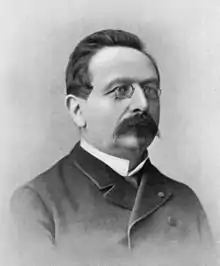Jean Antoine Villemin
Jean-Antoine Villemin (January 28, 1827 – October 6, 1892) was a French physician born in Prey, Vosges. In 1865 he demonstrated that tuberculosis was an infectious disease.

Biography
Villemin was born in the department of Vosges, and studied medicine at the military medical school at Strasbourg, qualifying as an army doctor in 1853. Afterwards he practiced medicine at the military hospital of Val-de-Grâce in Paris. In 1874 he became a member of the French Académie Nationale de Médecine, and was its vice-president in 1891.
In 1865 Villemin proved that tuberculosis was an infectious disease by inoculating laboratory rabbits with material from infected humans and cattle.[1] He published his results in the treatise Études sur la Tuberculose (Studies on Tuberculosis). Here he describes the transmission of tuberculosis from humans to rabbits, from cattle to rabbits, and from rabbits to rabbits. However, his findings were ignored by the scientific community at the time, and Villemin's contributions wouldn't be realized until years later when they were corroborated by other scientists. The Prix Leconte was posthumously awarded to Villemin (and its ₣50,000 presented to his heirs) in 1893 in recognition of his work.[2]
References
- Villemin, J.A. (1865). "Cause et nature de la tuberculose" [Cause and nature of tuberculosis]. Bulletin de l'Académie Impériale de Médecine (in French). 31: 211–216.
- See also: Villemin, J.-A. (1868). Etudes sur la tuberculose: preuves rationnelles et expérimentales de sa spécificité et de son inoculabilité [Studies of tuberculosis: rational and experimental evidence of its specificity and inoculability] (in French). Paris, France: J.-B. Baillière et fils.
- Shrady, George Frederick; Stedman, Thomas Lathrop (February 4, 1893). "Posthumous Honors to Villemin". Medical Record. 43 (5): 149. Retrieved 2 June 2012.
- Biography of Jean-Antoine Villemin (translated from French)
